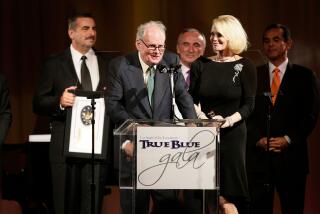Samuel Neaman, 89; Retailer Backed Israel’s Development
- Share via
Samuel Neaman, a philanthropist and former retailing manager of department store chains who encouraged innovation by rank-and-file employees and demanded devotion to the job, has died. He was 89.
Neaman died Wednesday of unspecified causes at his home in Oceanside, Calif., where he had lived in retirement for the last decade.
For the last quarter-century, Neaman had concentrated primarily on charity. His major beneficiary was the Technion-Israel Institute of Technology in Haifa, Israel, where he endowed the Samuel Neaman Institute for Advanced Studies in Science and Technology in 1978. He was president and board vice chairman of the American Technion Society and was deputy chairman of the international board of the institute, which five years ago awarded him the Technion Medal.
Born in Israel before it was a country, Neaman lived in London and served in the British Army during World War II.
After Israel became independent from Britain, he came to the U.S. selling bonds and seeking American investment to foster businesses in the new state.
“Our problem now is to make Israel self-supporting according to a master plan. In a small country this is only possible with a very efficient industry,” he told The Times in 1949 when he came to Los Angeles to meet with businessmen. “The only place we can come to learn the know-how is the United States. This isn’t a compliment; it is a well-known fact.”
Neaman gained international business acumen managing his family’s knitting company in Paris, starting his own blouse-making company in England and running a steel mill in Mexico. In 1962, he went to work for Meshulam Riklis, a post-war takeover artist who controlled the conglomerate Rapid-American Corp.
As hands-on manager of Riklis’ companies, Neaman ran such chains of stores as McCrory’s, S. Klein, Lerner’s, Best & Co. and J.J. Newberry.
Neaman made the McCrory’s variety store chain essentially his own -- turning loss to profit in his first year, cutting inventory by 50% and challenging and prodding employees to take responsibility for merchandising. A workaholic with a big ego, Neaman expected his staff members to put the company before their personal lives.
The manager’s expertise -- and weaknesses -- were described at length by author Isadore Barmash in his 1976 book “For the Good of the Company” and cited in the 1982 best-selling book by Thomas J. Peters and Robert H. Waterman Jr., “In Search of Excellence.”
Neaman stated his management philosophy in a 126-word credo mailed, along with a photo of himself, to 3,000 McCrory’s executives. Barmash wrote that the statement smacked of “the kibbutz mentality, of a socialistic approach to achievement ... of a Big Brother attitude.”
The mission statement of sorts by Neaman included such wording, for example, as : “We believe in the effectiveness of the multitude -- a great many normal people with normal talents working together supporting and compensating each other. We believe in guided autonomy.”
As McCrory’s and other pieces of the Riklis empire faltered in 1974, Neaman agreed to an arrangement, engineered by Riklis, to resign and become chairman of Interstate Stores Inc., which was trying to acquire parts of McCrory’s and S. Klein. But the deal fell through, and Neaman, then 61, simply faded from the front lines of business.
Widowed in 1999, Neaman is survived by a brother, Yfrah of London.
More to Read
Inside the business of entertainment
The Wide Shot brings you news, analysis and insights on everything from streaming wars to production — and what it all means for the future.
You may occasionally receive promotional content from the Los Angeles Times.








